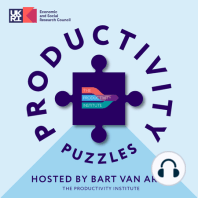40 min listen

Science and Innovation Policy for Hard Times
Science and Innovation Policy for Hard Times
ratings:
Length:
55 minutes
Released:
Feb 16, 2023
Format:
Podcast episode
Description
There is a new UK government department for science, innovation, and technology. Will the new standalone entity turn Britain into the science superpower that it hopes to become? Will the new department lift productivity growth during the hard times that the country is currently facing? This episode of Productivity Puzzles investigates these issues and more.
Host Professor Bart van Ark is joined by:
Richard Jones, Vice-President for Innovation and Regional Economic Development and Professor of Materials Physics and Innovation Policy, University of Manchester. Diane Coyle, Bennett Professor of Public Policy, University of Cambridge.
For more information on the topic:
Richard A.L. Jones (2022), Science and innovation policy for hard times: an overview of the UK’s Research and Development landscape.Diane Coyle and Jen-Chung Mei (2022), Diagnosing the UK Productivity Slowdown: Which Sectors Matter and Why?. A summary of the paper can be found on the Bennett Institute website.Richard A.L. Jones’ blog, Soft Machines.William J. Baumol (2002), The Free-Market Innovation Machine: Analyzing the Growth Miracle of Capitalism, Princeton University Press.Nicholas Bloom, Charles I. Jones, John Van Reenen, and Michael Webb (2020), Are Ideas Getting Harder to Find?, American Economic Review 2020, 110(4): 1104–1144.Jon Agar (2019), Science Policy Under Thatcher, UCL Press.Tristram Hunt (2021), The Radical Potter: Josiah Wedgwood and the Transformation of Britain, Penguin Books.John Harvey-Jones (1990), Troubleshooter, BBC Books (via bookshops).Griliches, Zvi (1957), Hybrid Corn: An Exploration in the Economics of Technological Change, Econometrica, Vol. 25, No. 4 (Oct.), pp. 501-522.On the Haldane Principle:Ministry of Reconstruction (1918), Report of the Machinery of government committee.David Edgerton (2009), The ‘Haldane Principle’ and other invented traditions in science policy. History and Policy: Policy Papers.William Jayneway (2018), Doing Capitalism in the Innovation Economy: Markets, Speculation and the State, Cambridge University Press.
About Productivity Puzzles:
Productivity Puzzles is brought to you by The Productivity Institute, a research body involving nine academic institutions across the UK, eight Regional Productivity Forums throughout the nation, and a national independent Productivity Commission to advise policy makers at all levels of government. It is funded by the Economic and Social Research Council.
Host Professor Bart van Ark is joined by:
Richard Jones, Vice-President for Innovation and Regional Economic Development and Professor of Materials Physics and Innovation Policy, University of Manchester. Diane Coyle, Bennett Professor of Public Policy, University of Cambridge.
For more information on the topic:
Richard A.L. Jones (2022), Science and innovation policy for hard times: an overview of the UK’s Research and Development landscape.Diane Coyle and Jen-Chung Mei (2022), Diagnosing the UK Productivity Slowdown: Which Sectors Matter and Why?. A summary of the paper can be found on the Bennett Institute website.Richard A.L. Jones’ blog, Soft Machines.William J. Baumol (2002), The Free-Market Innovation Machine: Analyzing the Growth Miracle of Capitalism, Princeton University Press.Nicholas Bloom, Charles I. Jones, John Van Reenen, and Michael Webb (2020), Are Ideas Getting Harder to Find?, American Economic Review 2020, 110(4): 1104–1144.Jon Agar (2019), Science Policy Under Thatcher, UCL Press.Tristram Hunt (2021), The Radical Potter: Josiah Wedgwood and the Transformation of Britain, Penguin Books.John Harvey-Jones (1990), Troubleshooter, BBC Books (via bookshops).Griliches, Zvi (1957), Hybrid Corn: An Exploration in the Economics of Technological Change, Econometrica, Vol. 25, No. 4 (Oct.), pp. 501-522.On the Haldane Principle:Ministry of Reconstruction (1918), Report of the Machinery of government committee.David Edgerton (2009), The ‘Haldane Principle’ and other invented traditions in science policy. History and Policy: Policy Papers.William Jayneway (2018), Doing Capitalism in the Innovation Economy: Markets, Speculation and the State, Cambridge University Press.
About Productivity Puzzles:
Productivity Puzzles is brought to you by The Productivity Institute, a research body involving nine academic institutions across the UK, eight Regional Productivity Forums throughout the nation, and a national independent Productivity Commission to advise policy makers at all levels of government. It is funded by the Economic and Social Research Council.
Released:
Feb 16, 2023
Format:
Podcast episode
Titles in the series (34)
Productivity in UK health care during and after the COVID-19 pandemic by Productivity Puzzles